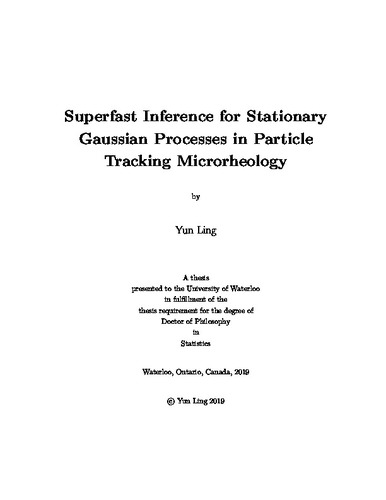| dc.contributor.author | Ling, Yun | |
| dc.date.accessioned | 2019-12-18 17:38:02 (GMT) | |
| dc.date.available | 2019-12-18 17:38:02 (GMT) | |
| dc.date.issued | 2019-12-18 | |
| dc.date.submitted | 2019-11-13 | |
| dc.identifier.uri | http://hdl.handle.net/10012/15338 | |
| dc.description.abstract | Particle tracking of passive microscopic species has become the experimental measurement of choice in diverse applications, where either the material volumes are limited, or the materials themselves are so soft that they deform uncontrollably under the stresses and strains of traditional instruments. As such, the results of countless biological and rheological analyses hinge pivotally on extracting reliable dynamical information from large datasets of particle trajectory recordings. However, to do this in a statistically and computationally efficient manner presents a number of important challenges. Addressing some of these challenges is the focus of the present work.
In Chapter 2, we present a superfast set of tools for parametric inference in single-particle tracking. Parametric likelihoods for particle trajectory measurements typically consist of stationary Gaussian time series, for which traditional fast inference algorithms scale as N-square in the number of observations. We present a superfast algorithm for parametric inference for stationary Gaussian processes and propose novel superfast algorithms for score and Hessian calculations. This effectively enables superfast inference for stationary Gaussian process via a wide array of frequentist and Bayesian methods.
In Chapters 3 and 4, we use the superfast toolkit to address two outstanding problems prevalent in many particle tracking analyses. The first is that particle position measurements are generally contaminated by various forms of high-frequency errors. Failure to account for these errors leads to considerable bias in estimation results. In Chapter 3 we propose a novel strategy to filter high-frequency noise from measurements of particle positions. Our filters are shown theoretically to cover a vast range of high-frequency noise regimes and lead to an efficient computational estimator of model coefficients. Analyses of numerous experimental and simulated datasets suggest that our filtering approach performs remarkably well.
The second problem we address is the considerable heterogeneity of typical biological fluids in which particle tracking experiments are conducted. In Chapter 4, we propose a simple metric by which to quantify the degree of heterogeneity of a fluid, along with a computationally efficient estimator and statistical test against the hypothesis that the fluid is homogeneous. The thesis is concluded by outlining several directions for future research. | en |
| dc.language.iso | en | en |
| dc.publisher | University of Waterloo | en |
| dc.subject | Toeplitz matrix | en |
| dc.subject | high-frequency camera errors | en |
| dc.subject | heterogeneity | en |
| dc.title | Superfast Inference for Stationary Gaussian Processes in Particle Tracking Microrheology | en |
| dc.type | Doctoral Thesis | en |
| dc.pending | false | |
| uws-etd.degree.department | Statistics and Actuarial Science | en |
| uws-etd.degree.discipline | Statistics | en |
| uws-etd.degree.grantor | University of Waterloo | en |
| uws-etd.degree | Doctor of Philosophy | en |
| uws.contributor.advisor | Lysy, Martin | |
| uws.contributor.affiliation1 | Faculty of Mathematics | en |
| uws.published.city | Waterloo | en |
| uws.published.country | Canada | en |
| uws.published.province | Ontario | en |
| uws.typeOfResource | Text | en |
| uws.peerReviewStatus | Unreviewed | en |
| uws.scholarLevel | Graduate | en |

